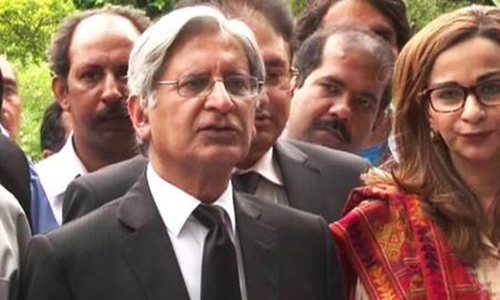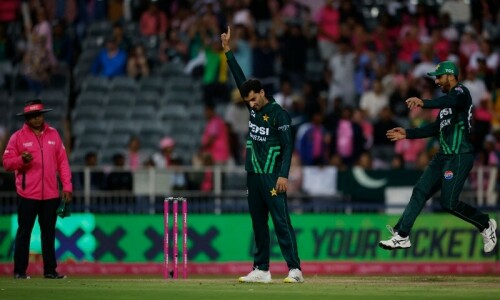FOR the nine-party opposition bloc, the parliamentary committee on Panama papers has hit a dead end unless the government significantly reviews its stance. To put pressure on the government, both PPP and PTI have filed separate references against Prime Minister Nawaz Sharif with the Election Commission of Pakistan (ECP).
Since the prime minister has publicly admitted that his three children own properties which he never mentioned in his declaration of assets, the two main opposition parties are of the view that Mr Sharif should be disqualified. Separately, leaders of the PPP and PTI have declared that they also intend to take their cases to the Supreme Court if the ECP fails to address the questions they have raised against the prime minister and members of his family.
The leaders of the two parties contend that as far as formulation of the terms of reference (ToR) for an investigation is concerned, the ball lies in the government’s court now as they would not relent on their demand of an investigation against the prime minister, along with his children, for owning offshore companies. On the other hand, the government line is that since foreign properties and companies are in the name of Nawaz Sharif’s children, only they can be investigated.
The question arises what could be the possible scenario if the ToR committee is dead, ECP incomplete and the Supreme Court unwilling to intervene unless political parties forge a consensus over the nature of the inquiry? According to a key PTI leader, who requested anonymity, his party leadership had absolutely no doubt that in the end it was Imran Khan who will hit the streets against the government.
At a TV talk show, PPP General Secretary Latif Khosa said his party leadership had asked him to prepare a separate reference to be filed with the National Accountability Bureau (NAB) after Eid.
Legally speaking, all these options constitute no threat to the government. With the completion of the tenures of its provincial members last month, the ECP at the moment is completely a non-functional entity. After facing relentless criticism following the May 2013 general elections, especially by the PTI leadership, the ECP is wary of getting into any fresh controversy.
Until the new provincial members of the ECP are appointed, the commission has even refused to hold by-elections. “Therefore, if somebody thinks or believes that the ECP will take any action on the PPP and PTI references, he must be out of his/her mind,” commented a mid-level ECP official while talking to Dawn. He added that even a complete election commission would have stayed away from these politically sensitive cases.
Likewise, in background discussions insiders from the two parties say they believe that the ECP option has been used just to exhaust available legal means so that if tomorrow they decide to hit the streets, they could argue that they did approach the commission but to no avail.
More or less same goes for the Supreme Court. In its reply to the government’s request to set up an inquiry commission, the top court had said between the lines that until there was a broad political consensus among major parties, it’s difficult for the proposed commission to probe as thorny an issue as that of the Panama papers.
The Supreme Court had adopted the same stance when the government wanted an inquiry commission of its choice to investigate the last general elections, until the two sides—PML-N and PTI—agreed upon a special commission set up through a presidential ordinance. The parliamentary committee on Panama Papers was actually meant to have a special commission, but so far it has failed to reach an agreement over the proposed investigations.
Ambivalent PPP
On a question about the PPP’s current belligerence towards the government and an unequivocal stance that the Panama probe must begin from the prime minister, the PTI leader said Asif Ali Zardari and his aides might further harden their position, but would resist the launch of an anti-government campaign.
“When was the last time the PPP launched an agitation against the government,” wondered the PTI leader, claiming that at the moment only Imran Khan had the charisma to attract big crowds and he would like to do on his own. However, he added, the party would welcome all political forces which were willing to join the anti-corruption struggle.
A senior PPP leader conceded that the party leadership was certainly in no hurry to hold rallies against the government. However, in the same breath, he offered a word of caution to the PTI leadership that the moment they distanced themselves from the PPP over the Panama papers issue, the government would heave a sigh of relief.
All said and done, political insiders and analysts agree on one point: regardless of what the PPP and PTI leaderships decide to do in the coming days, Panamagate is certainly going to be a watershed moment in the country’s political history. It will determine the new political configuration as well as the future of the PML-N government.
Published in Dawn, July 5th, 2016

















































